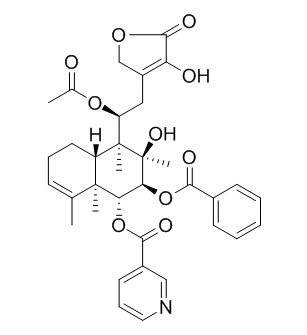Scutebata B
Scutebata B inhibited NO production efficiently with IC50 values of lower than 50 μM.
Inquire / Order:
manager@chemfaces.com
Technical Inquiries:
service@chemfaces.com
Tel:
+86-27-84237783
Fax:
+86-27-84254680
Address:
1 Building, No. 83, CheCheng Rd., Wuhan Economic and Technological Development Zone, Wuhan, Hubei 430056, PRC
Providing storage is as stated on the product vial and the vial is kept tightly sealed, the product can be stored for up to
24 months(2-8C).
Wherever possible, you should prepare and use solutions on the same day. However, if you need to make up stock solutions in advance, we recommend that you store the solution as aliquots in tightly sealed vials at -20C. Generally, these will be useable for up to two weeks. Before use, and prior to opening the vial we recommend that you allow your product to equilibrate to room temperature for at least 1 hour.
Need more advice on solubility, usage and handling? Please email to: service@chemfaces.com
The packaging of the product may have turned upside down during transportation, resulting in the natural compounds adhering to the neck or cap of the vial. take the vial out of its packaging and gently shake to let the compounds fall to the bottom of the vial. for liquid products, centrifuge at 200-500 RPM to gather the liquid at the bottom of the vial. try to avoid loss or contamination during handling.
Proc Biol Sci.2024, 291(2015):20232578.
bioRxiv - Biochemistry2023, 541790.
J Cell Biochem.2024, 125(4):e30537.
Mol Biol Rep.2024, 51(1):117.
Molecules.2019, 24(4):E744
Int J Mol Sci.2021, 22(17):9400.
Molecules.2023, 28(8):3474.
Molecules.2021, 26(3):695.
Sains Malaysiana2024, 53(2):397-408.
Int J Mol Sci.2020, 21(19):7209.
Related and Featured Products
Chemistry & Biodiversity, 2017, 14(11).
Constituents from Scutellaria barbata Inhibiting Nitric Oxide Production in LPS-Stimulated Microglial Cells.[Reference:
WebLink]
METHODS AND RESULTS:
The arial parts of Scutellaria barbata D. Don (Lamiaceae) efficiently inhibited NO production in BV2 microglial cells, and the active constituents were further isolated based on activity-guided isolation using silica-gel column chromatography, RP-C18 MPLC and prep-HPLC. As the results, 2 flavonoids including 6-methoxynaringenin (1) and 6-O-methylscutellarein (5), and 6 neo-clerodane diterpenes such as scutebarbatine W (2), Scutebata B (3), scutebarbatine B (4), scutebarbatine A (6), 6-O-nicotinolylscutebarbatine G (7) and scutebarbatine X (8) were isolated. The structures of these compounds were elucidated based on NMR and MS data, and the comparison of literature values. All the compounds except compound 7 inhibited NO production efficiently with IC50 values of lower than 50 μM. Particularly, compound 1 and 8 were the most efficient with IC50 values of 25.8 and 27.4 μM, respectively.
CONCLUSIONS:
This is the first report suggesting the potential of S. barbata on the reduction of neuroinflammation.
Journal of Natural Products, 2010, 73(2):233-236.
Cytotoxic neoclerodane diterpenoids from Scutellaria barbata.[Reference:
WebLink]
METHODS AND RESULTS:
Seven new neoclerodane diterpenoids, scutebata A, Scutebata B, scutebata C, scutebata D, scutebata E, scutebata F, scutebata G
(1-7), have been isolated from Scutellaria barbata. Compounds 1-3 possess a rare alpha-hydroxy group in their alpha,beta-unsaturated lactone rings. Their structures were elucidated by spectroscopic analysis, and the relative configuration of scutebata A was deduced using ROESY data and the computational DFT method. Compounds 1, 2, 4, 5, and 6 were evaluated for in vitro cytotoxicity against six human cancer cell lines: HL-60, SMMC-7721, A-549, SK-BR-3, CACO-2, and PANC-1.
CONCLUSIONS:
Scutebata A (1) showed weak cytotoxicity against SK-BR-3 with an IC(50) value of 15.2 muM.



